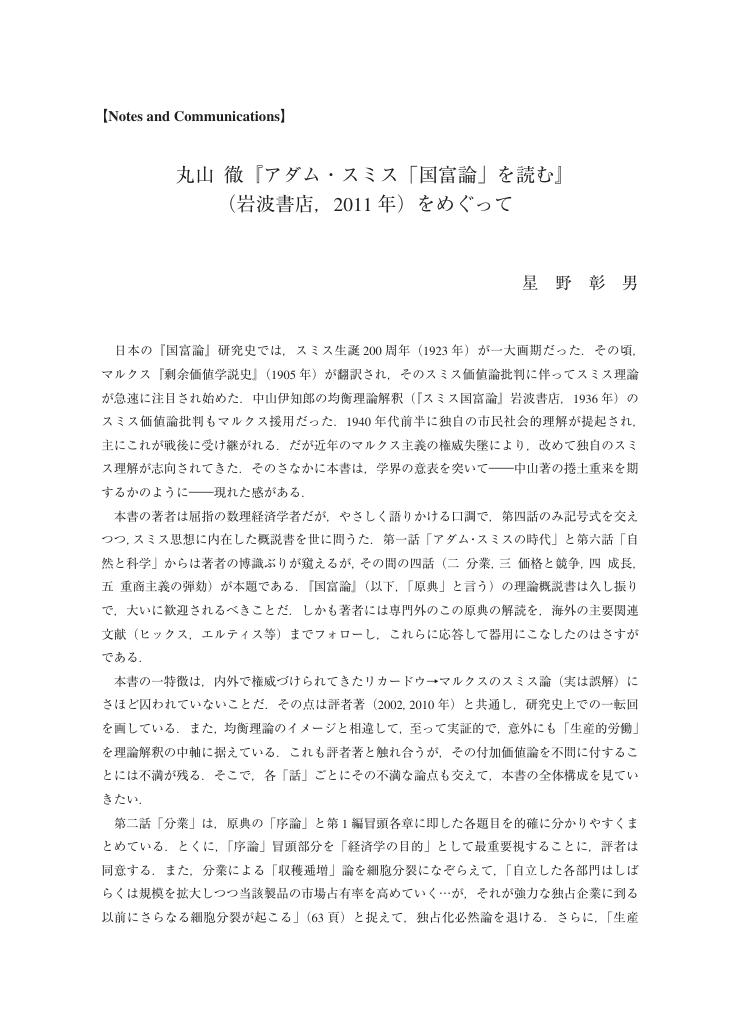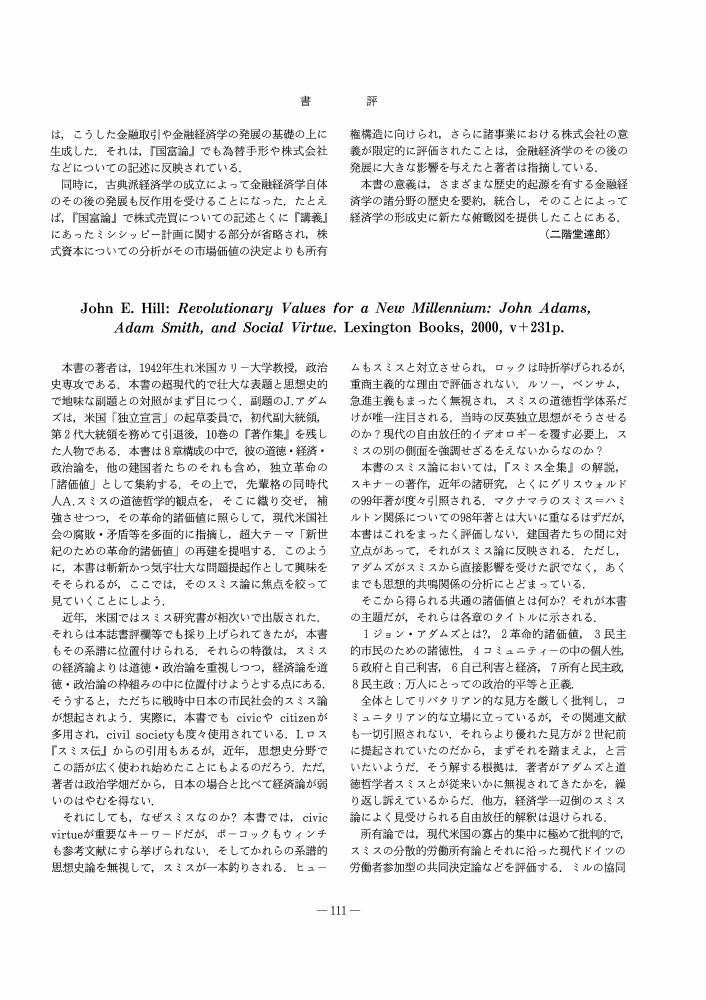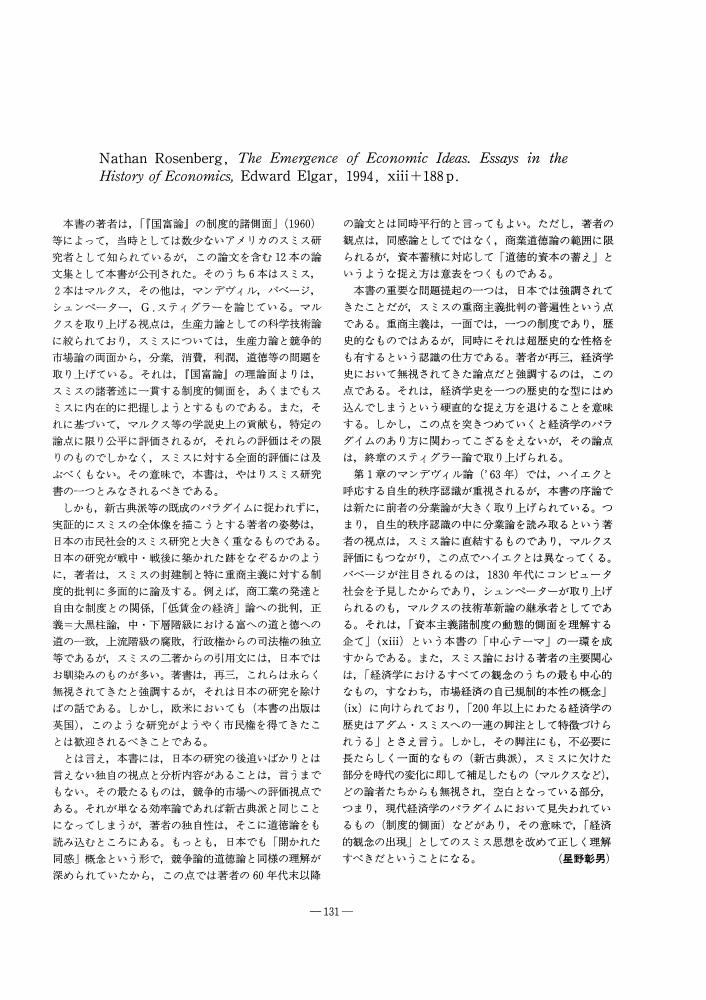1 0 0 0 OA 書評
- 著者
- 星野 彰男
- 出版者
- 経済学史学会
- 雑誌
- 経済学史研究 (ISSN:18803164)
- 巻号頁・発行日
- vol.61, no.2, pp.82-83, 2020 (Released:2020-02-29)
1 0 0 0 OA 高島善哉「国富論と生産力の体系」
- 著者
- 高島 善哉 星野 彰男 Robert Chapeskie
- 出版者
- The Japanease Society for the History of Economic Thought
- 雑誌
- 経済学史研究 (ISSN:18803164)
- 巻号頁・発行日
- vol.61, no.1, pp.66-91, 2019 (Released:2019-10-01)
Introduction by Akio Hoshino Zenya Takashima (1904-90)ʼs ʻThe Wealth of Nations and the System of Productive Powers,ʼ which has been translated into English here, is Chapter 5 of Part 2, “Adam Smith and the Problem of Civil Society,” in The Fundamental Problem of Economic Sociology-Smith and List as Economic Sociologists-, Tokyo: Nihon Hyoronsha, 1941 (The Works of Zenya Takashima, vol. 2, 1997, Tokyo). It was written in the midst of the Second Sino-Japanese War (1937-45) and directly before Japanʼs involvement in the Second World War (1941-45), a period during which the military system severely suppressed both academic inquiry and the general population. In modern Japan (1868- ), there was a particular emphasis on the introduction of German institutions and culture, and Friedrich Listʼs political economy and its national policy of productive powers were therefore welcomed. This work of Takashimaʼs called into question the prevailing trends at the time, and managed to achieve publication in spite of the severe censorship to which such texts were subjected. Because it talked about “Smith as List” and “List as Smith,” the censors seem not to have been able to understand its central critique. Having been written under such circumstances, its prose became very complicated and difficult, but it was covertly held in high regard. It has been said that many of its readers understood its ironic implication, and that some even took it to be a cover for Marxism. Its core chapter that regards Smithʼs moral philosophy as of greatest importance (Chapter 2: ʻThree Worlds in Smithʼ) has already been translated into English (Adam Smith: Critical Responses, vol. 5, edited by Hiroshi Mizuta, Routledge, 2000). The theme of Chapter 5 is solely Smithʼs economic theory.
1 0 0 0 OA 丸山徹『アダム・スミス「国富論」を読む』(岩波書店,2011年)をめぐって
- 著者
- 星野 彰男
- 出版者
- 経済学史学会
- 雑誌
- 経済学史研究 (ISSN:18803164)
- 巻号頁・発行日
- vol.56, no.2, pp.113-116, 2015 (Released:2019-08-26)
1 0 0 0 OA 田中正司『アダム・スミスの認識論管見』 社会評論社, 2013
- 著者
- 星野 彰男
- 出版者
- 経済学史学会
- 雑誌
- 経済学史研究 (ISSN:18803164)
- 巻号頁・発行日
- vol.56, no.1, pp.147-148, 2014 (Released:2019-08-24)
1 0 0 0 OA 新村聡氏の書評に答える
- 著者
- 星野 彰男
- 出版者
- 経済学史学会
- 雑誌
- 経済学史研究 (ISSN:18803164)
- 巻号頁・発行日
- vol.54, no.1, pp.106-107, 2012 (Released:2019-08-22)
1 0 0 0 OA 新村氏の書評に答える
- 著者
- 星野 彰男
- 出版者
- 経済学史学会
- 雑誌
- 経済学史学会年報 (ISSN:04534786)
- 巻号頁・発行日
- vol.44, no.44, pp.121-122, 2003 (Released:2010-08-05)
- 著者
- 星野 彰男
- 出版者
- The Japanese Society for the History of Economic Thought
- 雑誌
- 経済学史学会年報 (ISSN:04534786)
- 巻号頁・発行日
- vol.40, no.40, pp.111-112, 2001 (Released:2010-08-05)
1 0 0 0 OA アダム・スミス研究の現状と将来
- 著者
- 星野 彰男
- 出版者
- The Japanese Society for the History of Economic Thought
- 雑誌
- 経済学史学会年報 (ISSN:04534786)
- 巻号頁・発行日
- vol.39, no.39, pp.28-34, 2001 (Released:2010-08-05)
- 参考文献数
- 41
The viewpoint that the ideas described The Wealth of Nations is consistent with the labor theory of value has been rejected by all the schools of economics except for a few Japanese in the 1940's, who called Smith's thought a civil society idea. Afterwards, Y. Uchida and N. Kobayashi disputed this idea, but overlooked the point that Smith's commercial society was devoid of capital-stock. If this is the case, his labor theory of value in that society can be taken as an abstraction from his capitalist society. All the studies of his value theory as well as Marx's have missed this. Smith's added-value theory is applied to the theory of productive labor and the employment of capital, and so his criticism of the mercantile system.Theory of Moral Sentiments is taken not only as a passion theory but as an action theory. Although we can see the relation between both works, the overseas Adam Smith Rennaissance since 1976 disregards these viewpoints. But lately D. Winch and J. M. Buchanan have noted Smith's productive labor, thus his value theory may be reestimated, at which time the actual Adam Smith Rennaissance will start. In the case of Japanese studies on Smith, the civil society idea has long been accepted, but now its revision is needed because for the above reasons.
- 著者
- 星野 彰男
- 出版者
- The Japanese Society for the History of Economic Thought
- 雑誌
- 経済学史学会年報 (ISSN:04534786)
- 巻号頁・発行日
- vol.35, no.35, pp.186-187, 1997 (Released:2010-08-05)
- 著者
- 星野 彰男
- 出版者
- The Japanese Society for the History of Economic Thought
- 雑誌
- 経済学史学会年報 (ISSN:04534786)
- 巻号頁・発行日
- vol.34, no.34, pp.131, 1996 (Released:2010-08-05)
- 著者
- 星野 彰男
- 出版者
- 経済学史学会
- 雑誌
- 経済学史学会年報 (ISSN:04534786)
- 巻号頁・発行日
- vol.33, no.33, pp.184, 1995 (Released:2010-08-05)
1 0 0 0 OA 田中正司『アダム・スミスの自然法学』, 御茶の水書房, 1988, xii+364p.
- 著者
- 星野 彰男
- 出版者
- 経済学史学会
- 雑誌
- 経済学史学会年報 (ISSN:04534786)
- 巻号頁・発行日
- vol.27, no.27, pp.66-67, 1989 (Released:2010-08-05)
1 0 0 0 OA アダム・スミス没後二百周年記念特集
- 著者
- 星野 彰男 関 源太郎 和田 重司 小林 昇 水田 洋
- 出版者
- The Japanese Society for the History of Economic Thought
- 雑誌
- 経済学史学会年報 (ISSN:04534786)
- 巻号頁・発行日
- vol.28, no.28, pp.11-41, 1990 (Released:2010-08-05)
- 参考文献数
- 80











